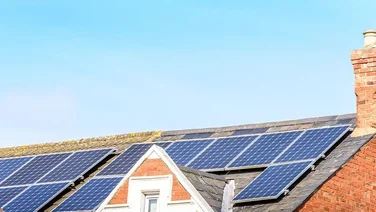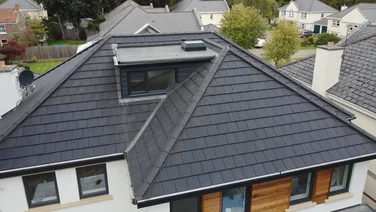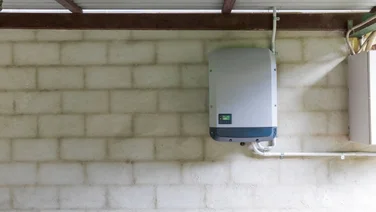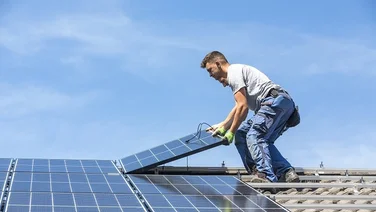We receive a small fee from trusted installers when you request a quote through our site. This helps us keep our content independent, well-researched and up to date – Learn more
✔ A Chinese company is planning on building a 60GW solar panel plant
✔ 99.53% of the world’s population live in countries with solar power
✔ Fill in the form above to receive free solar panel quotes from local specialists
We’ve gone from bright, sunny skies to storm clouds – but they will blow over.
The turnaround prompted by COVID-19 has been rapid and dramatic for the solar industry, as it has been for so many other sectors of the economy.
The global solar energy market was worth $52.5 billion (£42.33 billion) in 2018 (source: Allied Market Research, 2019). Worldwide, solar energy capacity went up by 27%.
Because of coronavirus, Norwegian research company Rystad Energy has forecasted that global growth of solar energy will be wiped out this year, and cut by 10% in 2021 (source: Bloomberg, 2020).
Just look at the US solar market, which rose by 23% in 2019, while the Solar Energy Industries Association (SEIA) had predicted a 47% growth in 2020.
But on March 23rd, with reports that some solar industry sectors could see at least a 50% decline, the SEIA brought 554 companies together to sign a letter urging the US Congress to help solar workers.
This doom and gloom is only temporary, though – and you can see why, below. If these reasons make you want to embrace a more self-sufficient future, complete this form to get free solar panel quotes from experts.
Solar power’s home nation is China – which is recovering
China possesses 175,032MW of the world’s 510,000MW solar energy capacity, according to the International Renewable Energy Agency (IRENA) – which works out at 34.32%.
One may fear for the solar industry, therefore, considering that coronavirus rose to prominence in China, spreading to more than 82,000 people in the nation.
However, the number of new daily infections appears to have plateaued – and solar power has maintained its position as a crucial part of the country’s energy production.
That’s shown by the fact that on March 29th, Bloomberg revealed that Chinese manufacturer GCL System Integration Technology was planning on building a massive, £2.05 billion solar panel plant.
The company aims to create a plant capable of making enough panels every year to generate 60GW – half the amount that was installed worldwide in 2019, according to Bloomberg.
So if you feared the Chinese solar industry may decline, and in doing so lower other countries’ confidence in solar energy, there’s no need to worry.
And just as China has, other nations will recover too. As they do, the solar power industry will pick up as well, along with the global economy.
Solar energy is global
Solar power can’t simply fall by the wayside; it’s been established in too many places. After all, the whack-a-mole characters would never lose if there were hundreds of holes.
Almost every country in the world produces solar energy, and at least 24 of them have a capacity of more than 1GW – including the UK, which has the seventh-largest capacity in the world.
Out of 207 countries and territories, only 12 don’t have solar energy, according to data we analysed from IRENA.
That’s 94.2% of places – or, to put it in population terms: 99.53% of people in the world live in places with solar energy.
The only nations not able to participate in the solar revolution are Central African Republic, Chad, Djibouti, Lesotho, São Tomé and Príncipe, South Sudan, Bhutan, the British Virgin Islands, St Martin, Turks & Caicos, Niue, and the Falkland Islands.
Solar makes financial sense…
Pursuing green options like solar power isn’t just a moral imperative; it’s logical.
Once you’ve set up the related equipment to gather and harness it, solar power is free. The sun gives energy away, every day, without prompting, and all you need to do is sit back and let that big ball of gas do the work.
Even solar panel costs have fallen dramatically in recent years, dropping 70% from 2010.
The same can’t be said for fossil fuels, which require expensive machines every time companies need to extract new loads and turn them into fuel.
…so investors will keep pouring money in
Before long, renewable sources will overtake fossil fuels to become the primary way to power vehicles – which will have long-lasting consequences.
40% of the current demand for oil can be serviced by clean, green electricity, according to the Financial Times, with solar and wind energy producing six to seven times more energy than fossil fuels, for the same investment.
That’s why renewable energy has risen as a proportion of global electricity by 31% since 2003, according to the World Bank.
Solar energy has been at the forefront of this green revolution, rocketing up at an exponential rate over the past decade, and depriving fossil fuel investors of hundreds of billions of pounds.
Since the coronavirus-prompted slowdown should affect all energy industries, the only logical step is to keep investing in renewables – the futureproof sector.
It can be monitored remotely during the crisis
Unless something goes seriously wrong – and it probably won’t, since solar panels typically last at least 25 years with barely any issues – a solar array can be controlled and overseen remotely.
This means that whether it’s producing energy for a business, a home, or a country, self-isolating and quarantined owners can still keep an eye on their systems.
Unlike many other sectors of the economy, the solar industry can keep going, with its panels producing energy and saving consumers money.
Solar power is a must in our climate change future
Climate change is becoming a bigger problem, both in reality and in the public consciousness.
The world is slowly coming to understand that the bleak consequences spouted by climate scientists were accurate predictions, rather than scaremongering.
As that realisation takes hold, the world is turning, culturally and legislatively, towards clean energy like solar power.
For instance, from 2020 onwards, all new homes in California must be built with rooftop solar panels.
That kind of progressive move won’t be stopped or cancelled out by the effects of coronavirus.
If you want to see how much you’d pay to go solar, use our solar panel cost calculator.
Innovation is everywhere
Solar technology already works fantastically – and it’s getting better, with the best solar panels constantly evolving. There are also frequent advances in areas like flexible solar panels and even transparent solar panels.
There are multiple new solar panel technologies as well, like solar desalination systems that could provide millions with clean water, solar clothes that could power your smartphone, and solar planes that’ll fly for a year in the stratosphere – without landing.
And as recently as March 30th, CNN reported on Ubiquitous Energy, a company that intends to produce and sell solar glass that can be used in windows, mobile phone screens, smart watches, and anything else made of glass.
The future’s bright, and it’s interwoven with solar material.
Summary
As with so many parts of society right now, the solar power industry has to act defensively, to bolster itself against the worst effects of the coronavirus crisis.
But solar energy will be resilient, and come out the other side of this nightmare without suffering long-term from the broader economic effects of this global slowdown.
If you want to prepare for the future, you can get bespoke quotes from solar specialists simply by filling in this form.








